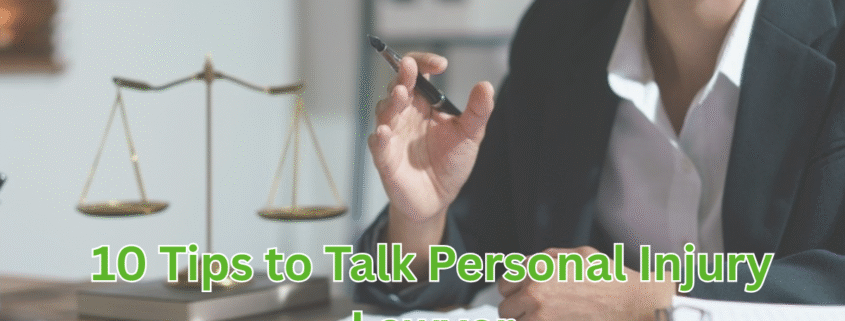10 Tips to Talk Personal Injury Lawyer
A split-second crash, a loose stair rail, or a sleepy trucker can upend a normal day in Utah. One moment you are heading to work; the next, you face aching joints, growing bills, and insurer calls you do not trust. Meeting a lawyer feels scary when all you want is peace and a working body.
But that first chat is just a managed conversation: What happened, how you got hurt, and how state law might help. And with some proper preparation, when you enter an office in Salt Lake City, or jump on a video call from your home in Cedar City, you can do it with confidence. It’s a guide that distills the process into clear steps, answers common worries and shows how a bit more upfront, honest and complete talk pulls better answers. Utilize these points to better manage stress and save yourself your health, money and now you can save your future.
Key Points You Should Know
- Gather records before the first visit
- Time limits in Utah can close fast
- Truth beats guesswork every time
- Ask about fees in writing
- Note the pain level day by day
- Let photos tell half the story
- Set clear goals for the outcome
- Confirm how often updates arrive
Why Consult with a Personal Injury Lawyer?
The complexity of Utah’s insurance rules, strict filing deadlines, and complicated filing rules stump even the sharpest residents. A seasoned accident attorney turns that maze into a straight path.
Reasons to call right away
- Preserve skid marks, store videos, and other fading-proof
- Beat the four-year limit (two years for wrongful death)
- Value past bills and future care needs
- Face pushy adjusters so you can rest
- Uncover hidden policy limits and umbrella coverage
- Draft clear claims while you attend therapy
- Cut medical liens through skilled negotiation
- Guide a jury if talks break down
- Use “no-win, no-fee” terms to ease the money strain
- Bring calm during a painful season
A short call early on often adds months of leverage and thousands of dollars to the final check.
10 Tips to Talk with a Personal Injury Lawyer
Meeting day shapes the whole claim. Turn it into a strong start with these ten proven steps.
Prepare Your Story in Order
Start with the very first hint of trouble, the yellow light you saw, the icy patch on the sidewalk, and move forward minute by minute. Write dates, times, and who was present. Add weather notes, traffic speed, or store lighting if they matter. Hand this timeline to the lawyer. A civil litigation lawyer will match each point with photos, health notes, and witness clues. A neat story saves hours of digging and gives the claim a clear backbone that judges respect. Keep the draft with you; if memory sparks later, jot fresh facts in the margins.
Bring Every Relevant Record
Paper beats talk in court. Gather police reports, EMT notes, X-ray films, pharmacy slips, and repair invoices. Sort them by date in a folder or a labeled thumb drive. If you lack a document, say, the business incident log, note its place and ask the lawyer to request it. A personal injury attorney can spot wrong billing codes, find insurance mistakes, and flag missing scans fast. Solid proof on day one turns a vague story into a target-rich case.
Track All Injuries and Symptoms
Pain diaries matter. Insurers raise offers once they see day-to-day hardship. Record:
- Pain score (1 – 10) morning and night
- Missed work hours and lost pay
- Sleep trouble, mood shifts, or memory gaps
- Medicine side effects, such as foggy focus
An injury compensation lawyer pairs these notes with doctor charts to show the real human cost, not dry numbers. Add photos of bruises or casts beside a coin or ruler for scale.
Be Up Front about Past Conditions
Old injuries do not kill a new claim if handled right. Tell the lawyer about prior back strain, old knee surgery, or past claims. Insurers will search databases and find them anyway. If you speak first, a tort law attorney can show how the new crash worsened old damage. Hiding facts shreds credibility in court and slashes offers, truth shields your payout.
Define Your Goal before You Arrive
Do you want enough to clear hospital debt, or are you ready for trial to seek full future wages? Your aim shapes the route. A trial advocacy lawyer will press harder if you crave a public verdict; a quicker settlement plan might fit if you need cash for rehab now. Write three needs (money figure, timeline, stress tolerance) then share them. The lawyer will explain odds and adjust tactics to match your life.
Ask about Fee Rules Plainly
Most Utah firms work on contingency: no fee unless you win. Even so, details vary. During the meeting, ask:
- What percentage comes off the top after costs
- Who pays the filing fees if we lose?
- How are medical liens handled at payout?
A contingency fee personal injury lawyer should hand over a written fee sheet. Read it there, not at home. Clear money talk builds trust and prevents shock after settlement.
Set Communication Preferences
Stress soars when calls go unanswered. Tell the lawyer how and when you like updates, weekly emails, quick texts for court dates, or phone calls only for big moves. Ask if a paralegal will handle routine notes. Get one direct number for urgent issues. Agreement on contact rhythms keeps you informed without feeling hounded.
Learn Realistic Timelines
Simple soft-tissue car crashes can settle in six months once treatment ends; multi-vehicle pile ups with disputed faults may stretch beyond a year. Ask for a phase chart: record collection, demand letter, talks, lawsuit filing, mediation, trial window. A car accident lawyer or slip and fall lawyer knows local court backlogs and can give sound advice. Planning life around these dates eases worry.
Understand Your Ongoing Role
Winning is teamwork. Your tasks may include:
- Attending all medical visits
- Sending new bills every Friday
- Staying silent about the case on social media
A personal injury attorney fights hard, but even the best cannot fix gaps you create. Fulfill each task fully. When you do, defense counsel loses ammo.
Confirm Next Steps before Leaving
Close by reviewing duties: the firm will request traffic-cam video within two days; you will forward the MRI disk by Friday; both sides will talk again in two weeks. Write these on your phone while still in the office. Clear next steps turn a tense visit into a roadmap with short checkpoints you can track.
Good prep, steady honesty, and clear questions shift power back to you. By following these ten tips, you’ll make your first meeting feel less like a gamble and more like a team huddle with a goal to win.
Talk to a Trusted Personal Injury Lawyer’s Team Now
Pain should not worsen because of paperwork or rude adjusters. When you need calm guidance in Utah, reach out to Cockayne Law. The firm has helped neighbors across the Wasatch Front secure fair results without hidden fees.
Their team handles car wrecks, slips, medical errors, and wrongful death claims. From the first free call, they outline rights, gather proof, and shield clients from insurer pressure while they heal. If settlement talks stall, their seasoned trial team is ready for court.
Contact Cockayne Law today, bring your records, and let experienced advocates push for the relief you and your family deserve.
Final Thought
That initial conversation, of course, opens the door to every subsequent step. In a setting where you are communicating honestly, asking tough questions, and bringing what you need to bring, you are helping the lawyer do their job and your claim. Utah’s laws favor the swift; evidence deteriorates and filing windows close. Well that, and everything above: It’s best to get in early and don’t tune out. By doing that, you’re no longer hurled and adrift, wandering the halls of bureaucracy half drunk, but on a road map to the money you need to heal and rebuild.
FAQs
How do I start a talk with an injury lawyer?
Begin with a short outline of the incident, your injuries, and current worries. Then ask if they handle similar cases in Utah and what comes next.
What should I avoid saying?
Do not guess about fault, downplay pain, or hide past injuries. Stick to facts and let medical records fill gaps.
How hard is it to win a case?
Success depends on proof, clear fault, and solid damages. Solid records, swift care and supportive legal help raise the odds.
How do I maneuver for the first meeting?
Carry police reports, medical bills, photographs, names of witnesses, pay slips that show any lost wages and any letters from insurance companies.
What do I say when asking for a lawyer?
State that you were hurt, give the event date, and request a free consultation to learn your rights.
What is the toughest question to ask a lawyer?
Asking “What is my case worth?” can feel awkward. A good attorney will share a range, explain factors, and note that final numbers depend on treatment and proof.
How often should my lawyer update me?
Set a schedule you like – weekly, bi-weekly, or event-based – and confirm it in writing at the first meeting.
What are two key questions to ask?
Ask, “Have you tried cases like mine before Utah juries?” and “How will expenses be covered if we do not win?” These reveal skill and financial clarity.

















